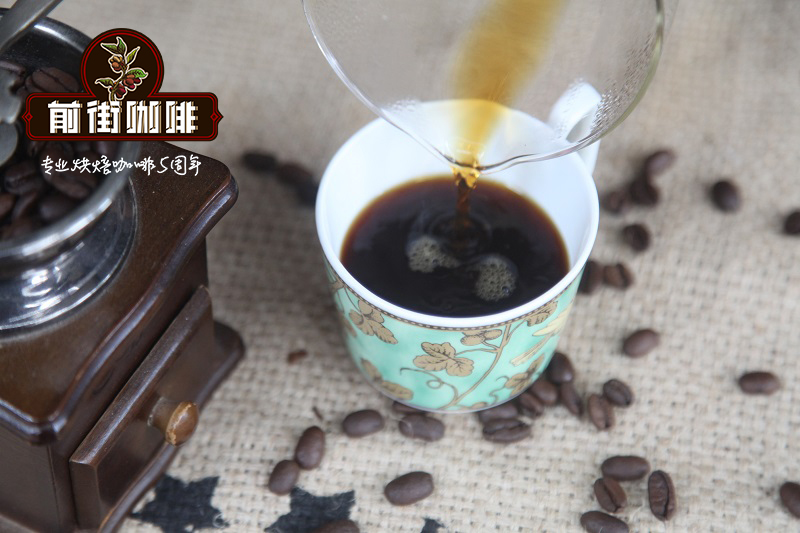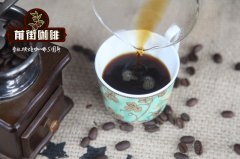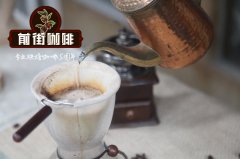The Origin time and Story of Kopi Luwak how much is a cup of Indonesian Kopi Luwak

Professional coffee knowledge exchange more coffee bean information please follow the coffee workshop (Wechat official account cafe_style)
Jack Nicholson plays a rich man with cancer in the movie "The Bucket List". He always sets up a distilled coffee machine in the ward, sometimes sarcastically satirizing the blue-collar Morgan Freeman (Morgan Freeman). Once he drinks Kopi Luwak, Freeman tells the allusion of Kopi Luwak while he is drinking. Jack listens to the origin of the most expensive coffee he drinks. Can not help but "spray coffee" (Chinese people spray tea, spray rice … ), "you're shitting me." It means "you're kidding me", but it literally means poop, which has a lot to do with the humor in the coffee making process. Two people roared with laughter!
You may have heard of the extremely expensive Kopi Luwak, which originally meant that after the wild civets swallowed the coffee fruit, the coffee particles could not be digested, so they were excreted along with their droppings. The fruit growers collected and washed them and made them into 'Kopi Luwak'. Because the products are scarce, the price is high.
(Indonesian farmers pick their own coffee beans)
Kopi Luwak has more Sulawesi in Sumatra, Jawa and Sulawesi of the Indonesian archipelago.
The Philippines is called Motit Coffee and Kape Alamid according to different regions.
East Timor is locally known as Kafe-Laku.
Vietnam is called Weasel Coffee (Weasel: weasel).
(the farmer chose the coffee beans himself.)
Kopi Luwak Kopi Luwak from Indonesia (Indonesian: Kopi Coffee / Luwak civet).
The United States is called Civet coffee or cat poo coffee Kopi Luwak.
The civet eats the cherry coffee on the tree, and the coffee excreted after passing through the digestive tract is called Kopi Luwak.
Then feed it to the civet to collect its poop. )
Wild muskcats in Indonesia like sweet and red coffee, so they pick it carefully and eat it.
But because of the civet's constitution, coffee beans cannot be digested and excreted from the body.
Originally, the farmer only washed his poop and sifted out the coffee beans before baking, but the taste was very different. Wild civets have limited poop, making this caffeine the most expensive coffee in the world.
The point is that "civets can pick out top coffee beans", and the small amount is worth cherishing, not because of the process of digesting the civets' intestines and stomach.
However, today's coffee farms in Indonesia have evolved to manually pick coffee fruits, then feed them to farmed civets, and then collect their excreted coffee beans, instead putting the cart before the horse.
Musk cat poop (gold) can also become Indonesia's authentic "gold".
Indonesian civets are now kept in captivity, not in the wild. Even the coffee beans are artificially fed, and the cats don't pick them out by themselves. (speechless)
Collect civet poop.
I hope you're not eating when you read this. (the picture above proves that civets can't digest coffee beans.)
Then wash, dry, bake, and complete the "Kopi Luwak".
There are pictures of civet printed on the outside of the coffee can. I have seen that there is also a gift box packed, and there is a "civet poop specimen" next to the coffee beans as a souvenir to the guests. (I'm dizzy.)
The civet (because of its natural talent, it was then bred artificially and began the "labor career" of eating coffee beans all its life)
Look at the mud, there is even a direct purchase of vacuum packaging of "poop raw beans" …...
(maybe the merchant bought it back and packed it and then mixed it with other coffee beans and sold them at a high price. I guessed it. )
Kopi Luwak Kopi Luwak from Indonesia (Indonesian: Kopi Coffee / Luwak civet).
The United States is called Civet coffee or cat poo coffee Kopi Luwak.
The civet eats the cherry coffee on the tree, and the coffee excreted after passing through the digestive tract is called Kopi Luwak.
Civets are naturally nocturnal animals, and they often go to coffee gardens to eat coffee cherries, thus affecting the coffee harvest. Not every farmer knows the value of Kopi Luwak, so they are often killed in many places.
Civets are easy to get close to people, and they can often be seen climbing on the roof of their homes in Bali.
Most wild civets live in trees, using their keen sense of smell to find ripe tropical fruits and favorite foods. They are omnivorous animals, mainly mature fruits and seeds, and also eat insects and snakes. Therefore, the stools emitted by really wild Kopi Luwak will be mixed with all kinds of substances.
Civets naturally choose the most ripe and sweetest fruits, so they eat ripe red coffee cherries, including coffee pulp and beans.
Coffee cherries are not digested in the stomach, and the enzymes in the civet's digestive tract combine with coffee beans, destroying the protein, thus reducing the bitterness of the coffee.
The coffee beans are indigestible, so they are excreted. The beans are still covered with sheepskin. After washing, drying and baking, they become Kopi Luwak.
Because things are scarce, Kopi Luwak is the most expensive coffee in the world. Generally speaking, the price you can buy in Indonesia is more than NT $1 million, or about NT $3, 000. The most expensive coffee in the world is said to be the most expensive in Britain. )
Sumatra is a well-known wild and captive Kopi Luwak producing area.
It is said that most of the wild Kopi Luwak in Sumatra is grown in Arabica, and most of it is coffee from old trees, but some of the Kopi Luwak are fed a mixture of robusta and Arabica beans, or even all of them.
Is it delicious or hard to swallow?
It is said that experts who have tasted this kind of coffee have gone to two extremes in their comments on its taste. One describes the coffee as "the best in the world". The taste is so unusual that it is difficult to describe in words and words: "with a bit of dirt, slightly choking taste and visceral taste, it won't go away in the mouth for a long time until the last drop." Another evaluation is quite the opposite: "it's hard to swallow, it's a complete gimmick, and it's not worth paying for stinky coffee."
Baked Kopi Luwak
Coffee experts say that most Luwak coffee comes from low-altitude robusta beans, suggesting that civets prefer robusta beans to Arabica beans at higher altitudes. Indonesian coffee itself has the taste of earth and traditional Chinese medicine, and its consistency is also the highest in all continents, but Luwak coffee has a better taste and consistency, especially with a consistency almost close to syrup, and its flavor is very special (if it can be described by fragrance. ). So, if you don't like the taste of Indonesian coffee in the first place, it's certain that you will hate Luwak coffee more; but if, on the contrary, you like the fishy smell of aged Indonesian beans or Indian-style beans, you may fall in love with Luwak coffee with similar flavor.
* * *
Sheep can climb trees, but can they stand so steady?! These Moroccan sheep uncles have practiced, and children can't easily imitate them.
Some Moroccan nut oil argan oil is also made using a similar principle. In Morocco, the local people will drive the sheep to the nut tree and let the sheep eat the fruit of the nut tree. The sheep will discharge the indigestible fruit, and the local people will treat the fruit and extract the nut oil.
What a spectacle! It seems that with a little training, these sheep may be able to form a Li Tangyang stunt troupe. I worship sheep a little bit more.
In this way, there is another kind of meat that can't be eaten. Alas-- it is really step by step towards the path of vegetarians. )
These photos are not synthetic, these sheep in the tree are real!
The sheep grew up in Morocco and climbed the Moroccan nut tree (Argan Tree) mainly to find food.
The droppings of these sheep contain the seeds of the tree and are used locally to extract oil.
The oil produced is called Moroccan hazelnut oil (Argan Oil) and is used locally as kitchen oil and even cosmetics!
Important Notice :
前街咖啡 FrontStreet Coffee has moved to new addredd:
FrontStreet Coffee Address: 315,Donghua East Road,GuangZhou
Tel:020 38364473
- Prev

The method of making black tea macchiato and the difference between macchiato and macchiato coffee
Professional coffee knowledge exchange more coffee bean information Please follow the coffee workshop (Wechat official account cafe_style) in fact, it has been found that 50 Lan has launched a new drink, but because recently all drink Qingyu black tea, I haven't been to 50 Lan for a while, so if you are full and passing by today, try the new beverage black tea macchiato. Black tea macchiato is to mix the black tea first, and then add thick tea to it.
- Next

The world's most precious coffee bean-the origin of the name Kopi Luwak Kopi Luwak recommended roasting degree
Professional coffee knowledge exchange more coffee bean information please follow the coffee workshop (Wechat official account cafe_style) Indonesian civet coffee beans (Kopi Luwak) Kopi Luwak do you know the origin of the name Kopi Luwak? Kopi Luwak is produced by the feces of Indonesian coconut cats (a kind of civet) as raw materials, so it is called Kopi Luwak. This kind of animal
Related
- Detailed explanation of Jadeite planting Land in Panamanian Jadeite Manor introduction to the grading system of Jadeite competitive bidding, Red bid, Green bid and Rose Summer
- Story of Coffee planting in Brenka region of Costa Rica Stonehenge Manor anaerobic heavy honey treatment of flavor mouth
- What's on the barrel of Blue Mountain Coffee beans?
- Can American coffee also pull flowers? How to use hot American style to pull out a good-looking pattern?
- Can you make a cold extract with coffee beans? What is the right proportion for cold-extracted coffee formula?
- Indonesian PWN Gold Mandrine Coffee Origin Features Flavor How to Chong? Mandolin coffee is American.
- A brief introduction to the flavor characteristics of Brazilian yellow bourbon coffee beans
- What is the effect of different water quality on the flavor of cold-extracted coffee? What kind of water is best for brewing coffee?
- Why do you think of Rose Summer whenever you mention Panamanian coffee?
- Introduction to the characteristics of authentic blue mountain coffee bean producing areas? What is the CIB Coffee Authority in Jamaica?

